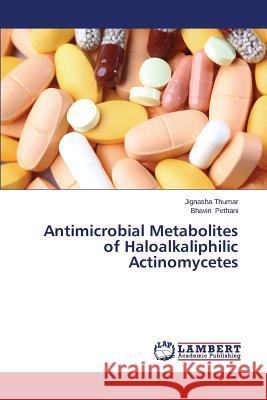Antimicrobial Metabolites of Haloalkaliphilic Actinomycetes » książka
Antimicrobial Metabolites of Haloalkaliphilic Actinomycetes
ISBN-13: 9783659480232 / Angielski / Miękka / 2013 / 84 str.
Actinomycetes have provided important bioactive compounds of high commercial value and continue to be routinely screened for new bioactive substances. There is an alarming scarcity of new antibiotics currently under development in the pharmaceutical industry. The present study highlights the isolation and characterization of haloalkaliphilic actinomycetes with respect to their antimicrobial potential. A total of 14 halophilic, alkaliphilic and haloalkaliphilic actinomycete isolates were isolated from the saline soil samples collected from the saline desert of Kutch under varied conditions of salt (0-20% w/v NaCl) and pH (7-10). The organisms belonged to the genus Streptomyces with fluffy filamentous aerial mycelia. Their ability to secrete antimicrobial metabolites was tested against a range of Gram-positive and Gram-negative test cultures. Three isolates H3, H4 (Halophilic) and HA5 (haloalkaliphilic) emerged as the potent antimicrobial producers. They produced the antimicrobial agent against Micrococcus in liquid culture after 15 days of incubation under shaking conditions. The compound was extracted with ethyl acetate and bioautographed against Micrococcus.
Actinomycetes have provided important bioactive compounds of high commercial value and continue to be routinely screened for new bioactive substances. There is an alarming scarcity of new antibiotics currently under development in the pharmaceutical industry. The present study highlights the isolation and characterization of haloalkaliphilic actinomycetes with respect to their antimicrobial potential. A total of 14 halophilic, alkaliphilic and haloalkaliphilic actinomycete isolates were isolated from the saline soil samples collected from the saline desert of Kutch under varied conditions of salt (0-20% w/v NaCl) and pH (7-10). The organisms belonged to the genus Streptomyces with fluffy filamentous aerial mycelia. Their ability to secrete antimicrobial metabolites was tested against a range of Gram-positive and Gram-negative test cultures. Three isolates H3, H4 (Halophilic) and HA5 (haloalkaliphilic) emerged as the potent antimicrobial producers. They produced the antimicrobial agent against Micrococcus in liquid culture after 15 days of incubation under shaking conditions. The compound was extracted with ethyl acetate and bioautographed against Micrococcus.











